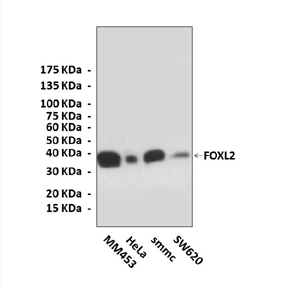Anti-FOXL2: Rabbit FOXL2 Antibody |
 |
BACKGROUND FOXL2 is a member of the forkhead/HNF-3-related gene family of transcription factors that are highly conserved and involved in many developmental processes and in cellular differentiation. As the other member of the family, FOXL2 possesses a well-conserved winged helix domain that binds DNA to a 7-bp core recognition motif (5'-G/A-T/C-C/A-A-A-C/T-A-3'). Another feature of FOXL2 is the presence of a polyalanine domain of 14 alanines, located to the C-terminus with respect to the DNA binding domain.1 Although the physiological function of this polyalanine tract remains unknown, its expansion from 14 to 24 residues accounts for 30% of the reported mutations in BPES patients. The 14 to 24 expansion induces extensive nuclear and cytoplasmic FOXL2 protein aggregation. FOXL2 is a critical factor essential for ovary differentiation and maintenance, and repression of the genetic program for somatic testis determination.2 FOXL2 prevents trans-differentiation of ovary to testis through transcriptional repression of the Sertoli cell-promoting gene SOX9. FOXL2 has apoptotic activity in ovarian cells. Moreover, FOXL2 suppresses ESR1-mediated transcription of PTGS2/COX2 stimulated by tamoxifen. FOXL2 is also a regulator of CYP19 expression. In addition, FOXL2 participates in SMAD3-dependent transcription of FST via the intronic SMAD-binding element. It was shown that FoxL2 plays a key role in activin induction of the FSH-beta gene.3 It is a transcriptional repressor of STAR. And it was shown that FOXL2 activates SIRT1 transcription under cellular stress conditions. It also activates transcription of OSR2. Mutations in FOXL2 gene are a cause of blepharophimosis syndrome and premature ovarian failure. Moreover, it was demonstrated that Mutant FOXL2 is a potential driver in the pathogenesis of adult-type granulosa-cell tumors (GCTs), the most common type of malignant ovarian sex cord–stromal tumor (SCST).4
REFERENCES
REFERENCES
1. Carlsson, P. & Mahlapuu, M.: Dev. Biol. 250:1-23, 2002
2. Ottolenghi, C. et al: Hum. Mol. Genet. 14:2053-62, 2005
3. Corpuz, P.S. et al: Mol. Endocrinol. 24:1037-51, 2010
4. Shah, S.P. et al: New England J. Med. 360:2719-29, 2009
2. Ottolenghi, C. et al: Hum. Mol. Genet. 14:2053-62, 2005
3. Corpuz, P.S. et al: Mol. Endocrinol. 24:1037-51, 2010
4. Shah, S.P. et al: New England J. Med. 360:2719-29, 2009
Products are for research use only. They are not intended for human, animal, or diagnostic applications.
Параметры
Cat.No.: | CA1104 |
Antigen: | Short peptide from human FOXL2 sequence. |
Isotype: | Rabbit IgG |
Species & predicted species cross- reactivity ( ): | Human, Mouse, Rat |
Applications & Suggested starting dilutions:* | WB 1:1000 IP n/d IHC 1:50 - 1:200 ICC n/d FACS n/d |
Predicted Molecular Weight of protein: | 39 kDa |
Specificity/Sensitivity: | Detects endogenous levels of FOXL2 proteins without cross-reactivity with other related proteins. |
Storage: | Store at -20°C, 4°C for frequent use. Avoid repeated freeze-thaw cycles. |
*Optimal working dilutions must be determined by end user.
Документы
Информация представлена исключительно в ознакомительных целях и ни при каких условиях не является публичной офертой








